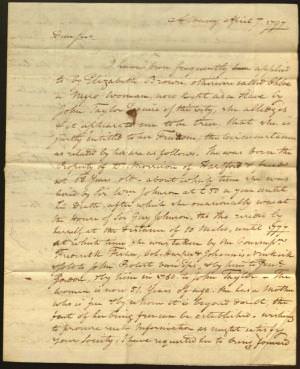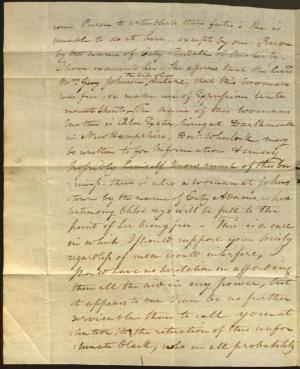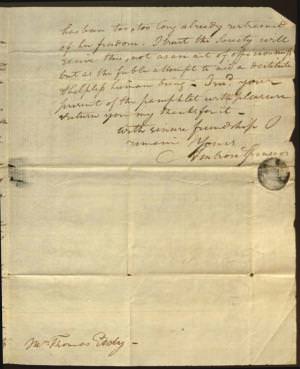A Letter from the New York Manumission Society



Download original documents, page 1 2 3
Transcription:
Albany April 7. 1797
Dear sir,
I have been frequently applied to by Elizabeth Brown, otherwise called Cloe a Negro Woman, now kept as a slave by John Taylor Esquire of this City, she alleges & it appears to me to be true, that she is justly intitled [sic] her Freedom, the circumstances as related by how are as follows. She was born the Property of Dr. Morrison of Hartford and free at 18 years old, about which time she was hired by Sir Wm. Johnson at 50 Pounds a year until his Death, after which she occasionally was at the House of Sir Guy Johnson, tho she resided by herself at the Distance of 10 miles, until 1777 at which time she was taken by the Commissrs. Frederick Fisher, Col. Harper, and Johannes Newkirk & sold to Robert van Eps, & by him to Genl. Groom, & by him in 1780 to John Taylor.
The woman is now 51 years of age. She has Mother who is free & by whom it is beyond doubt, the fact of her being free can be established. Wishing to procure such Information as might satisfy your Society, I have requested her to bring forward some Person to establish these facts. She is unable to do it here, except by one Person by the name of Caty Rudall of this City. I have examined her. She affirms that she has heard Mme. Guy Johnson [the wife of Guy] declare that this Woman was free, or make use of Expressions tantamount thereto.
The name of this woman’s mother is Chloe Exeter, living at Dartmouth in New Hampshire, Rev. Wheelock may be written to for information & will very possibly himself know much of this business. There is also a woman at Johnstown by the name of Caty Adams, whose testimony Chloe says will be full to the point of her being free.
This is a case in which I should suppose your society regardless of men would interfere, should have not hesitation in affording them all the aid in my power, but it appears to me I can be no further serviceable than to call your attention to the situation of this unfortunate Black, who in all probability has been too, too long already restrained of her freedom. I trust that the Society will receive this, not as an act of officiousness but as the (unclear: humble?) attempt to aid a destitute and helpless human being. I received your present of the pamphlet with pleasure & return you my thanks for it.
With sincere friendship I remain Yours, Ambrose Spencer
(To) Mr. Thomas Eddy.
